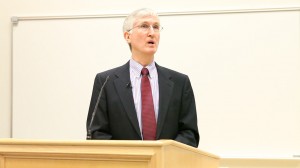A BYU graduate and successful international lawyer explained in a seminar on Thursday how his undergraduate degrees in Chinese and philosophy, plus the influence of the gospel, have shaped his career.
The seminar was sponsored by the College of Humanities and took place in the Joseph F. Smith Building.

Timothy Stratford is a graduate of Harvard Law School and a current partner in the Beijing office of Covington & Burling LLP. He and his wife moved to China in 1982, where they raised their three children and lived for over 25 years.
“I have found something very valuable about putting BYU on my résumé,” Stratford said. “It allows me, in a rather quiet way, to let other people know about my religious tradition.”
Like many other BYU graduates and students, Stratford learned Chinese on his mission in Hong Kong, which sparked his interest in the language and culture. Since he first moved there in 1982, China has undergone major changes.
“We were able to witness what I think is the greatest transformation of a large group of people that has ever taken place in the history of this world. Never before have so many people changed in so many profound ways so rapidly as we have seen in China in the last 30 years,” Stratford said. “Today, a degree in Chinese is more valuable than ever before.”
Stratford explained how China’s business market has become a major world power, even just in the last 10 years.
“I tell American companies that they need to have a China strategy,” Stratford said. “Either because the Chinese market is going to be so important to you that you’d better figure out how to get into that market, or because you’re going to have Chinese competitors who are going to come compete with you in your market.”
Stratford also told students that they need to work hard to set themselves apart from competitors.
“To those of you who are studying Chinese, I would say that if you really want to use it, you’re going to have to get good at it,” Stratford said. “You’re going to have to work hard and be fluent. … If you can negotiate and read Chinese legal documents, you will really set yourself apart in the job market.”
Stratford then explained the value of a degree in philosophy.
“Philosophy helps you understand more clearly what people really think. It teaches you to listen, to read carefully, to ask questions, to define your terms and to recognize the assumptions that are being made in a conversation,” Stratford said. “Philosophy is extremely helpful to you whenever the task at hand involves understanding and reconciling differences in opinion, which happens frequently in the business world.”
Stratford concluded his talk by discussing how the gospel can direct people in their education, careers and life decisions.
“We ask the Lord, ‘What should I do with my life? What would you like me to do?’ And the answer is, keep His commandments and seek to bring forth and establish the cause of Zion,” Stratford explained.
He told students that the Lord usually leaves life decisions up to us. He sets guidelines and provides direction as we seek, ask and learn wisdom, but He expects us to use our agency as we build up His kingdom.
“I believe that my humanities education has been very important in helping me build the kingdom of God,” Stratford said. “I think that because I have wanted to try to live my life as the Lord desires me to that I have been blessed in many, many ways.”




